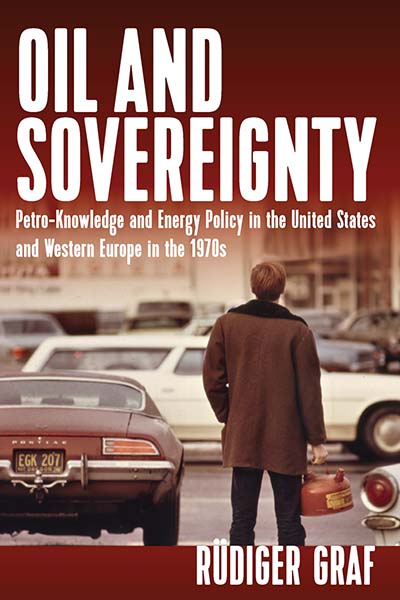
Oil and Sovereignty: Petroknowledge and Energy Policy in the United States and Western Europe in the 1970s by Rüdiger Graf

National sovereignty is arguably more compromised today than at any other moment since 1945, as a variety of pressing developments illustrate. Populism is on the rise across Europe, as new political movements seek to restore their nations’ alleged authority by assaulting the supranational powers of the European Union. Massive financial institutions are undermining the monetary power of states through a web of capital flows. International firms are expanding their global supply chains every year, relocating production around the world in search of the lowest cost labor. Even the trade wars unleashed by Donald Trump ostensibly aim to reassert American control over its own economy in response to the perceived decline of the U.S. nation-state. While challenges to national power have always existed, in many ways the roots of today’s global quagmire of sovereignty date to the 1970s—a decade that witnessed emergence of a new constellation of multi-national corporations, the financialization of the economy, the monetary shocks that would precipitate a new round of European integration, and, crucially, two oil crises that profoundly illustrated the limitations of the western liberal state.
Indeed, the 1960s “seem like a far distant past,” while the 1970s mark “the beginning of our era” (394–395)—so Rüdiger Graf contends in his exceptionally well-researched and thought-provoking book, Oil and Sovereignty: Petro-Knowledge and Energy Policy in the United States and Western Europe in the 1970s, translated from the German version (2014) into English just this year, and slightly updated to include recent literature. His twin focus on energy and sovereignty is apt because energy offers an early and essential lens to understand how Western states and their social scientific elite first began grappling with systemic challenge to sovereign power after 1945. The oil price shock of late 1973 challenged what had become the political-economic paradigm that undergirded the Trente Glorieuses, in which cheap oil facilitated growth, growth generated employment and permitted welfare reform, and these in turn provided legitimacy to the state. On a discursive level, the oil crisis of 1973 shook this edifice to the core. As Ernst-Wolfgang Böckenförde put it—one of Europe’s leading constitutional jurists—1973 revealed how the “liberal, secular state” had become “dependent on prerequisites that this state ‘itself [cannot] guarantee.’” (6) Once the Organization of Petroleum Exporting Countries (OPEC) demonstrated its cartel power to restrict oil, and once the multinational oil “majors”—companies of vast size and wealth, like Exxon or British Petroleum—refused calls to give preferential treatment to their mother countries, elites began fearing their states had reached the limits of their sovereign power. For Otto Graf Lambsdorff, a leading figure in West Germany’s liberal party, 1973 had the potential to mark the “end of this economy and social order and an end to growth in this country” (204).
Graf’s greatest success is situating this energy shock in a broader study of the production of policy-relevant knowledge. According to Graf, during the 1970s, energy first became a distinct field of knowledge—one that united the previously separate spheres of nuclear power, petroleum, or coal, and one that states sought to master by cultivating expertise that could make sense of the changing world of hydrocarbons. Indeed, all Western publics initially lost faith in their governments for failing to acquire and understand the information—what Graf labels “petro-knowledge”—that was needed to navigate the new landscape of petroleum in which producer countries and multi-national corporations seemed poised to become coequals with states like the United Kingdom, France, or even the United States. The story of 1973, as told by Graf, was thus a problem of information as much as it was one of energy. And it is a story in which various types of scholars—foremost among them geologists, economists, and political scientists—fought to position themselves as the experts on energy.
This struggle between experts to forge a framework to understand 1973 explains, in part, the difficulty states faced in communicating confidence in their sovereign power to their domestic publics. Here lies Graf’s second success, embedding the oil crisis in a wider discussion of sovereignty, which he sees less as an attribute than something states seek to demonstrate to their own citizens as well as to their rivals: a “claim that may be asserted, questioned, attacked and defended” (7). Western governments responded to the oil shock by using energy forecasts and petro-knowledge as a symbolic display of their sovereign power, a demonstration of their ability to understand and control external challenges to their authority. The sheer abundance and variety of these forecasts, however, undercut states’ aspirations as often as it reinforced them, for each political faction could, if it wanted to, find experts to present its own point of view. This problem was most apparent in the Federal Republic of West Germany, which saw a proliferation of research centers devoted to energy during the 1970s. But the United States, too, saw deep rifts among the new cadre of energy elites, captured best in the contest between MIT economist Morris Adelman and State Department energy doyen James Akins, who vehemently disagreed on whether oil developments could and should be understood through purely economic laws. Over the course of the decade, moreover, the diverse response of experts generated an array of new theories to understand the relationship between resources, growth, and power. Complex Interdependence (Robert Keohane and Joseph Nye), Soft Energy Paths (Amory Lovins), Ecological Economics (Hermann Daly and Nichoas Georgescu-Roegen), and Energy Economics (Partha Dasgupta and Geoffrey Heal) all, to varying degrees, owe their existence to the oil turbulence of the 1970s. Most generally, the concept of security expanded dramatically, among scholars as well as politicians, beyond mere military mobilization to encompass social and economic matters. After 1973, energy security became a byword for guaranteeing the secure flow of oil to industrial societies, now a policy goal of most western states.
Despite these commonalities in knowledge production, countries differed dramatically in how they responded to the price spikes, differences that Graf shows were rooted as much in the energy history of Europe and America as it was in the way these regions mobilized expertise. After 1973, the United States, given its still substantial domestic supply of oil, the dominance of its international petroleum companies, and its powerful oil lobby, aimed to expand the supply of energy, above all domestic oil. The limited conservation measures pursued under the Nixon administration were intended primarily to strengthen America’s bargaining power vis-a-vis OPEC. West Germany, by contrast, pursued the polar opposite strategy, at least by contemporary standards. While the Federal Republic did work through international organizations to stabilize its oil supply, by 1977, energy conservation and energy efficiency assumed the highest priority in energy policy, since this country lacked its own oil reserves and had no major petroleum oil company with which to negotiate concessions or contracts in the Middle East. Indeed, through the work of various university institutes and external experts, like Hans K. Schneider and Klaus M. Meyer-Abich, “energy savings” was conceptualized as the third critical energy source of the future, alongside nuclear power and fossil fuels. The legacy of this divergence persists to this day, now that decoupling energy use from growth has become a pillar of Germany’s Energiewende.
Yet, throughout the book, Graf takes pains to underscore how 1973 was not the extreme rupture that so many contemporaries and later historians have claimed it to be. Under his studious guidance, one sees that nearly every transformation commonly associated with the oil shock was already present or at least incipient. The growing power of the producer countries, concerns over global energy scarcity, fears about the sovereignty-eclipsing power of multi-national oil companies, anxieties about slowing economic growth, even concerns about the limits of sovereignty—all of these appeared on the historical stage before 1973. For Graf, the oil shock itself was less important as an economic turning point, and more so as a symbolic one that forced elites to reinterpret the notion of sovereignty and find new ways of staking that claim, whether through the new field of petro-knowledge or new forums of international cooperation, like the International Energy Agency.
If there is any fault in his book, it is the absence of neo-liberalism as a category of analysis or a movement. Other recent studies present the 1970s as the crucial seedbed decade that laid the foundation for the aggressive application of market ideology to nearly every political and social problem. Most persuasively, Meg Jacobs has made this argument for the United States, showing how the oil crises so thoroughly dismantled trust in American political governance that they opened the door for a new approach to political economy in the 1980s.[1] In this approach markets, particularly international markets as Quinn Slobodian has illustrated, were designed and imposed by neo-liberals specifically to dilute the power of any given state.[2] Though Graf does point out that in the field of energy, planning and forecasting became more not less central to governance during the 1970s, he shies away from any reference to neoliberalism, and thereby misses a chance to link his otherwise outstanding book into a larger corpus of work on political economy. This minor quibble aside, Oil and Sovereignty paints a profoundly complex picture of the wrenching transformations of the 1970s, and makes a powerful case that the roots of our current travails lay in that traumatic decade that is only now coming into better historical focus with detailed studies like his own.
Reviewed by Stephen Gross, New York University
Oil and Sovereignty: Petroknowledge and Energy Policy in the United States and Western Europe in the 1970s
by Rüdiger Graf, translated from German by Alex Skinner
Publisher: Berghahn Books
Hardcover / 474 pages / 2018
ISBN: 9781785338069
To read more book reviews click here.
Published on November 1, 2018
[1] Meg Jacobs, Panic at the Pump: The Energy Crisis and the Transformation of American Politics in the 1970s (New York: Hill and Wang, 2016)
[2] Quinn Slobodian, Globalists: The End of Empire and the Birth of Neoliberalism (Cambridge, MA.: Harvard University Press, 2018)




